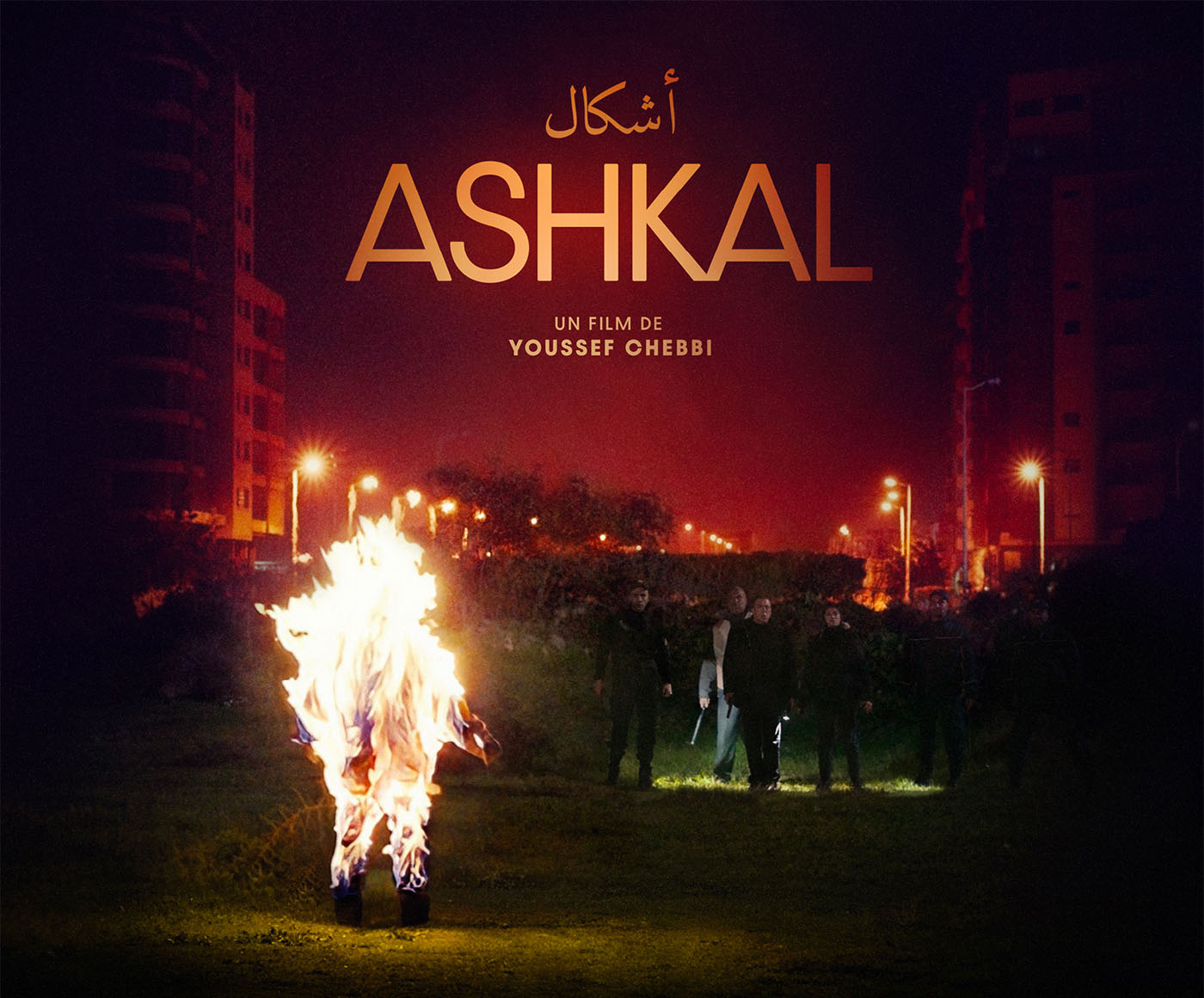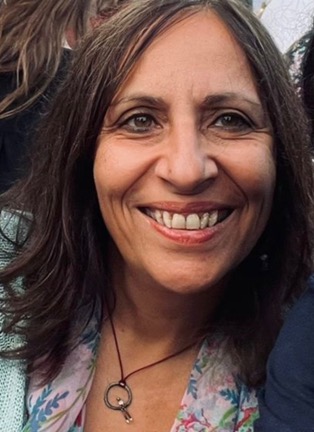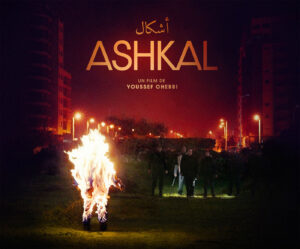Viola Shafik
Hitting European movie theatres these days, the mystery Ashkal (2022) by Youssef Chebbi is what I propose to call a Tunisian cinema of post-revolution dystopia. In fact, it does not represent a singular appearance, but melts into a tide of dystopian or quasi-dystopian films directed by Chebbi and two of his same-generation colleagues and occasional collaborators, Ismaël, and Ala Eddine Slim. Hence, and despite the fact that Ashkal makes use of the known repertory of genre cinema, that is, dead bodies, good and bad cops, suspense and uncanny lighting, the film might feel disappointing for someone expecting the usual kick of a mainstream detective film or thriller. What you find instead is a rather bleak, atmospherically dense socio-political introspection into a national trauma, the trauma of a totalitarian state that has its ears and eyes everywhere, the trauma of a disillusioned generation that went out to protest but has so far gained little for it’s country’s future.
This may sound surprising given the fact that Tunisia was praised for being the only Arab country that could achieve a “democratic” transition without experiencing a civil war or an immediate totalitarian backlash. Yet, the political polarization between liberals and Islamists has fostered extremism. Social and gender inequality has remained enhanced by corruption and mismanagement. Little wonder recent Tunisian cinema has not stopped to point its fingers at all these issues, sometimes even combining all of them, focusing particularly on female vulnerability in view of the effective alliance of patriarchal family structures and the male dominated abusive police apparatus as pictured in films by female directors, in Kaouther Ben Hania’s Beauty and the Dogs (2017) and Hinde Boujemaa Noura’s Dream (2019). While their heroines show signs of resilience and raise their voices, dystopian films like Ashkal do not.
Ashkal’s protagonists too seem strangely muted and aloof, almost like living dead. Its plot is shaped around the investigation of an increasing number of suspected, yet undocumented, self-immolations. Of course, we still recall that it was Tunisian street vendor Mohamed Bouazizi who with his self-immolation on Dec. 17, 2010 triggered not only a series of self-immolations in other countries but also the massive protests, the Arab thawra or so-called Arab Spring, first in Tunisia then elsewhere leading to crucial changes in the political landscape of the region. Askhal evokes quite naturally this highly dramatical political backdrop.
However, it departs from genre rules in neither offering a clearcut resolution nor at fleshing out of the characters’ motivations or emotional involvement in an overtly empathetic manner. Instead, its lead figures remain somehow enigmatic, like the shadows of a bad dream; that is, Fatma (Fatma Oussaifi), a young female detective and her sidekick, Batal (Mohamed Houcine Grayaa), a nice but troubled family father and cop come across as pretty taciturn and closed personalities. Even when they take action, they remain more observers than change agents. This renders in turn the very object of their observation, namely, the locus of investigation at least as prominent as themselves in the story’s trajectory: that is, a vast unfinished construction site, the Carthage Gardens, once a showpiece of Ben Ali’s regime, but then abandoned after his ousting in 2011, leaving behind a vast landscape of concrete ruins.
It is here where the immolated body of a night guard is found. Soon the corpse of a young maid is discovered, while a few days later even the body of a policeman gets consumed by fire. Like the others, his remains reveal a peaceful and willing surrender, with his clothes and shoes folded away orderly. As detectives Fatma and Batal start their inquiry, they find themselves under fire from different sides: Fatma, a persona non grata, gets insulted by her colleagues because of her father’s involvement in the Truth Commission that investigates police offences during the dictatorship, while Batal plays a dangerous game in clandestinely providing insider information to the representatives of the new system. At the same time, the reasons of the rising number of immolations become more and more obscure and seem to assume supernatural dimensions.
With this, after its premiere in Cannes, the film left critics unsatisfied: “A bit more to hold on to would have made whatever message the film wants to send more powerful, whereas now we are left with a film that will leave you puzzled once the credits start to roll,“ noted Marc van de Klashorst of the International Cinephile Society. Yet, they may not have noticed, like a shapeshifting fire, Ashkal — the film’s title literally means “forms“ in Arabic — the film too plays with form, narrative forms or, let’s say, narrative ciphers, architectural building blocks, and, last but not least, possible interpretations. What the film successfully produces is the strongly agoraphobic effect of becoming a stranger in one’s own home/land. In one scene, when Batal puts his daughter to bed, he turns to the window, just to find his sight barred by the opposite brick wall of a neighboring building. He is left with nothing else to look at except for his own reflection in the window’s glass. He abruptly closes the curtain to shut out his own sight.
Also, the never ending traveling shots through Ben Ali’s cement “Garden,“ like the endless walks of the characters through its concrete carcasses produces a similar huis clos effect (think Sartre’s play No Exit). The film’s color palette in turn is highly restricted. In daytime it hardly ever exceeds the grey-green spectrum — quite astonishing for a Mediterranean country —hence, we find ourselves enclosed in a truly life- and joyless, suffocating space. This preoccupation with a hardly inhabitable place is in my view what informs the inventory of post-revolutionary dystopia most. And if I were to distill a message from it, I’d say: While the ghost of Bouazizi’s violent death has not stopped hovering over people’s heads, democratic transition proved to be a bumpy road and its players are gambling away the minimal chances they had to create something new.
You might be still wondering what exactly I mean by dystopia in this context. Social sciences consider utopia/dystopia a speculative trend in literature (consequently also in film). Their respective imagination of the near or far future, however, was tightly linked to the present. Very often dystopia is simply read as an anti-utopia, that is, a dark instead of a brightly designed future, or as a bad place and not a good one. However, as Tom Moylan noted, critical-dystopian texts “linger in the terrors of the present even as they exemplify what is needed to transform it.” A state of terrorized lingering — or might we say traumatized muting — indeed comes forth in Chebbi’s Ashkal but also in his previous film Black Medusa (2021), co-directed with Ismaël. This one was advertised as a “film noir“ not just because of its haunting black-and-white photography but also because of its story of a young inconspicuous woman who pretends to be mute but transforms at night into a deadly female avenger who kills men.
Here too, the directors shy away from a too overt emotional involvement with their characters they and seem to keep their distance as uninvolved observers, a characteristic that we can trace back to an even earlier film produced at the height of revolution. “A city from nowhere; faces in a hostile land, words that couldn’t understand each other, trees that see, the life and the death of a Babylon is how the three filmmakers Ismaël, Youssef Chebbi and Ala Eddine Slim chose to introduce their post-Tunisian uprising film. Produced by their then joint venture Exit Productions, Babylon (2012) may be regarded as a strongly non-invasive “direct cinema“ documentary.
In the wake of the disintegration of Muammar Gaddafi’s regime, the trio observe in Babylon the arrival of the first laborer refugees from Libya to a makeshift camp erected in the middle of the arid desert on the Tunisian side of the border. Meticulously they capture the camp’s enlargement during the course of the year 2011, the growing and shifting population that hails from the four corners of the world: Bangladesh, Sub-Saharan Africa, the Middle East and elsewhere until the camp’s eventual dismantling some months later. Ismaël, Chebbi and Slim also, quite en passant, document the dynamics and difficult logistics of the humanitarian enterprise: the challenges of coordination between NGOs, Tunisian and international supervisors, officials and residents, and the common attempts to deal with the extremely difficult conditions dictated by the climate, the politically charged situation on both sides of the border and the incessant influx of new waves of refugees.
With some of the home states too slow to react in organizing repatriation, the refugees’ difficulties in finding someone who is able to listen to their concerns are also reflected on the linguistic level. Most tellingly, the film refrains from subtitling the various languages heard on screen. The resulting linguistic obscurity makes you join the camp’s Babel effect. This radical esthetic decision, in my opinion, as it systematically avoids utilizing verbal testimonies to transport grievances and conflicts, I find almost a trade mark of the trio’s common as well as individual filmmaking. In their previous and subsequent work they share the preference for silent, or let’s say, muted protagonists, just to begin with Ala Eddine Slim’s short film The Stadium (2010). Produced in the period when Ben Ali dictatorship was still in place, it pictures a lonely man roaming during the night of a decisive soccer game through a deserted, frighting cityscape. Here, just like in Ashkal, the familiar space of the modern city was rendered unfamiliar, hostile and uncanny.
Moreover, Slim’s post-revolution fictions have retained the same preference for silence and muted characters. The lead figure of The Last of Us (2016), a fugitive African man, does not utter a word over the whole film, during his long journey, crossing the desert, the city, until he eventually retreats into nature to live there from hunting and where he, in the end, in a totally emblematic picture, his naked body in the middle of a water fall, simply fades out, leaving back nothing but the running waters.
This final scene of The Last of Us reads to me like a wishful utopian return to the origins of man as integral part of nature and not as master of the universe. Three years later, in his Tlamess (2019) Slim used once more a similar trope, namely the evasion of army conscript into the woods. This time the taciturn hero finds himself a female companion with whom he commonly and against all odds tries to acquaint to the wilderness. This is not to say that Slim’s depiction of that space is paradisal, here as well, we encounter the same reduced color-palette and muted characters. Hence, Slim’s “back to nature“ visions don’t read like a negation but as a complimentary anti-thesis to Chebbi’s uninhabitable dystopian cityscape, a space in which silence figures prominently. I am speculating here but the latter may be carrying all signs of a traumatic silence: “Silences in this context are both a repeat of a disconnecting experience as well as a manifestation of a silencing identification with the original silencer,“ notes psychoanalyst Maria Ritter. It with this that Slim’s, Ismaël’s and Chebbi’s dystopia simultaneously refer to the past as well as to the future, and their characters with a foot in the abusive police apparatus and a foot outside.














